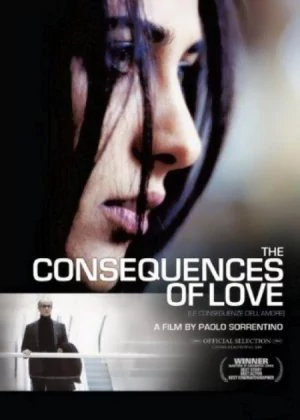Le Conseguenze dell'Amore

Not a big fan of mafia films? Neither am I, but give the genre one last chance and try out Paolo Sorrentino's (This Must Be The Place) Le Conseguenze dell'Amore and you might be surprised what gems lay hidden in the world of Italian organized crime. Sorrentino delivers a major upgrade to the classic genre elements and comes with an entirely fresh take on the genre, a welcome surprise for non-believers like me.

Mafia lovers beware though, because Conseguenze is nothing like all the other mafia films you know and love. Sorrentino cooks up a more modern, subdued and ultimately more stylish vision of the Italian criminals, to the point where you might not even realize you're watching a mafia film at all. Only during the film's final 30 minutes does Sorrentino unmask the whole story, revealing the film's explicit ties to the Italian underground.
The film follows Titta di Girolamo, an old man living a lonely life in a small, secluded hotel. Titta isn't the most social of characters, lives as a recluse and avoids most social interaction. He plays cards with the hotel owners once in a while, keeps tabs on the local waitress and calls his ex-wife when he wants to talk to his children, but most of the time he just retreats to his room or sits in the hotel lobby, enjoying the view.
Until at one point a mysterious individual delivers a suitcase to his room. Then Titta transforms, puts on his best suit, unveils a flashy BMW in the hotel garage and drives to a nearby bank, where dedicated employees await him to count the money stacked inside the suitcase. The transformation is swift and seamless, but only temporary. Once back at the hotel Titta becomes his old self again, waiting for the next suitcase to arrive.

The mafia genre tends to come off as rather old-fashioned, none of that in Le Conseguenze dell'Amore. Sorrentino's switches between strong, still shots and delicately planned camera arcs, giving the film a very modern yet extremely stylish finish. Even though Sorrentino's camera moves around a lot, every move is precise and controlled, never taking the easy way out. The camera work alone goes a long way in revitalizing the genre.
The soundtrack is just as noteworthy. Sorrentino goes for a clever mix of classical tunes and more electronic-oriented tracks, aptly supporting the visuals and creating a strong and solid, almost old-fashioned vibe of class, just based on more modern touches. By now the choice of music may be a little less daring, but the effect hasn't diminished a single bit. In combination with the visuals, Sorrentino delivers a flawless audiovisual experience that exists in an entirely different realm from all the Godfathers and Goodfellas.
The acting too is spotless. Toni Servillo is the perfect Titta, a boring, inconspicuous and plain looking man who can transforms into a sharp, slick businessman in the blink of an eye. Magnani is convincing as Servillo's love interest, the rest of the secondary cast is solid, even though they don't have that much work. Much of the film's weight lies on Servillo's shoulders and he manages perfectly well.

The first hour betrays little of the film's true intentions, only during the final 30 minutes does Sorrentino clear up a lot of the mystery surrounding Titta's person. The transition between both parts is smooth and gradual though, not providing any real twists but slowly easing the audience towards the natural outcome of the plot. The second half of Le Conseguenze dell'Amore is not unlike a Kitano (yakuza) flick, there are some interesting parallels to be drawn between both directors, but ultimately Sorrentino delivers a film that is most of all his own.
Le Conseguenze dell'Amora is the perfect film for people who aren't really too taken by the classic mafia films and are yearning for a more modern version of the Italian underground antics. Sorrentino delivers a classy, stylish take on the genre, full of audiovisual sorcery and based on a superb character, convincingly played by Servillo. A film that ages quite well and should appeal to a larger crowd of arthouse enthusiasts and crime fans alike.